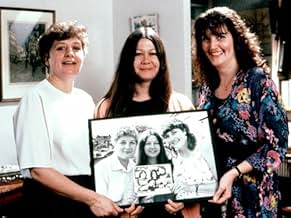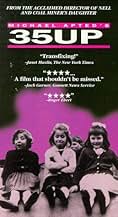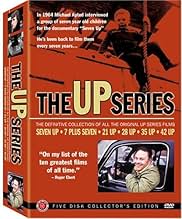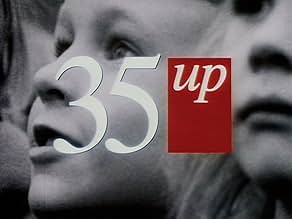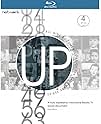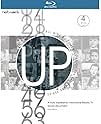35 Up
- TV Movie
- 1991
- 2h 3m
IMDb RATING
8.0/10
2.8K
YOUR RATING
Director Michael Apted interviews the same group of British-born adults after a seven-year wait as to the changes that have occurred in their lives during the last seven years.Director Michael Apted interviews the same group of British-born adults after a seven-year wait as to the changes that have occurred in their lives during the last seven years.Director Michael Apted interviews the same group of British-born adults after a seven-year wait as to the changes that have occurred in their lives during the last seven years.
- Won 1 BAFTA Award
- 1 win & 2 nominations total
Bruce Balden
- Self
- (as Bruce)
Jacqueline Bassett
- Self
- (as Jackie)
Symon Basterfield
- Self
- (archive footage)
- (as Symon)
Andrew Brackfield
- Self
- (as Andrew)
John Brisby
- Self
- (as John)
Suzanne Dewey
- Self
- (as Suzy)
Charles Furneaux
- Self
- (archive footage)
- (as Charles)
Nicholas Hitchon
- Self
- (as Nick)
Neil Hughes
- Self
- (as Neil)
Lynn Johnson
- Self
- (as Lynn)
Paul Kligerman
- Self
- (as Paul)
Susan Sullivan
- Self
- (as Sue)
Tony Walker
- Self
- (as Tony)
Michael Apted
- Interviewer
- (voice)
- (uncredited)
Peter Davies
- Self (ages 7, 14)
- (archive footage)
- (uncredited)
- Director
- Writer
- All cast & crew
- Production, box office & more at IMDbPro
Featured reviews
The 'Up Series' represents one of the most fascinating and unusual uses of film in cinema history - a documentary life-long chronicle of the lives of 14 people starting at 7 years old, revisiting them every seven years through age 49 (so far).
While I could quibble, wishing for a bit more depth here and there (especially with the women, where there's a bit too much emphasis on love and marriage at the expense of all else), it's really an astounding, moving, frightening and uplifting document. There's no way to watch this remarkable series of films without reflecting deeply on one's own life, and how you have changed (and stayed the same) over your own lifetime.
While Michael Aped deserves every bit of credit he's received for this amazing piece of cultural anthropology, it's important to note this first film, 7 Up,was actually directed by Paul Almond, and Apted was a that point a researcher for the project.
While I could quibble, wishing for a bit more depth here and there (especially with the women, where there's a bit too much emphasis on love and marriage at the expense of all else), it's really an astounding, moving, frightening and uplifting document. There's no way to watch this remarkable series of films without reflecting deeply on one's own life, and how you have changed (and stayed the same) over your own lifetime.
While Michael Aped deserves every bit of credit he's received for this amazing piece of cultural anthropology, it's important to note this first film, 7 Up,was actually directed by Paul Almond, and Apted was a that point a researcher for the project.
Life continues; a parent's life ends (and it is never one that ends too early and you never get over it);; new life is created and comes into family; one of the subject (Tony's) wife takes up some extra work duties and it is clear she has to run the house; life springs some horses to ride around and feel merry; life is a little more awkward when a figure gets recognized in public (though "you get the odd one who is rude..."); life leads you sometimes to Bangladesh (what a mess) or Wisconsin (there are deer, surprised); life is harder because the government under Thatcher was (lightly put) a grave disappointment; another parent died and you can see every bit of the devastation in their eyes and the 30s is the time when people start losing their parents; and life is going to keep going on even if things looked grim (or quite good) for the particular subject at hand.
I find 35 Up to be as on par with the absorbing feeling and interest into this series as the rest - when it comes to absorption and the Up films, just call me a big pack of paper towels - but one of the fascinating parts here is how some of the subjects (like Nick) look back on the previous Up film and how they thought, or really the spouses thought, they came across made it so they were not sure to want to appear in the next film. Charles doesn't appear here at all, a shame as he was one of the more low-key captivating ones from 21 and 28 Up (working for the BBC perhaps ironically he didn't want to appear on TV in this film).
Sometimes seeing oneself on film can do that, and I think that it is remarkable just how many of the subjects agreed to be in the series up till 35 much less than this continued for decades afterward. And in the case of John, of course, they didn't appear in the previous entry and that means we are seeing then go from 21 to 35 and that is also another sort of jump (he didn't even get interviewed by Apted due to a falling out, who knows why, and he's speaking with an assistant here) as he makes his case for Bulgarian charity. Because who doesn't want to give to... Bulgaria!
I'm not sure what else I can add that Roger Ebert didn't touch on in his multiple write-ups on the films in this series, and I'm sure there will be even more to get out of seeing how these adults and their spouses and (if they choose to be included) the kids in 42, but this segment in particular is so striking because of how these children are not only in full adulthood but now, more or less, parents and losing their parents and finding that living any decent life means finding peace in one's work and social situation and, moreover, responsibilities.
Take it from someone who knows: when you're 14 or even 21, you literally don't know how much you are going to bristle and smile and maybe look away from how you were at that age by the time you're 35 (or, if you have kids which I don't, you'll see those qualities in them). That's the power of this series and 35 Up in particular.
I find 35 Up to be as on par with the absorbing feeling and interest into this series as the rest - when it comes to absorption and the Up films, just call me a big pack of paper towels - but one of the fascinating parts here is how some of the subjects (like Nick) look back on the previous Up film and how they thought, or really the spouses thought, they came across made it so they were not sure to want to appear in the next film. Charles doesn't appear here at all, a shame as he was one of the more low-key captivating ones from 21 and 28 Up (working for the BBC perhaps ironically he didn't want to appear on TV in this film).
Sometimes seeing oneself on film can do that, and I think that it is remarkable just how many of the subjects agreed to be in the series up till 35 much less than this continued for decades afterward. And in the case of John, of course, they didn't appear in the previous entry and that means we are seeing then go from 21 to 35 and that is also another sort of jump (he didn't even get interviewed by Apted due to a falling out, who knows why, and he's speaking with an assistant here) as he makes his case for Bulgarian charity. Because who doesn't want to give to... Bulgaria!
I'm not sure what else I can add that Roger Ebert didn't touch on in his multiple write-ups on the films in this series, and I'm sure there will be even more to get out of seeing how these adults and their spouses and (if they choose to be included) the kids in 42, but this segment in particular is so striking because of how these children are not only in full adulthood but now, more or less, parents and losing their parents and finding that living any decent life means finding peace in one's work and social situation and, moreover, responsibilities.
Take it from someone who knows: when you're 14 or even 21, you literally don't know how much you are going to bristle and smile and maybe look away from how you were at that age by the time you're 35 (or, if you have kids which I don't, you'll see those qualities in them). That's the power of this series and 35 Up in particular.
This was the first of the UP series that has since led onto 42 UP. for anybody who doesn't know, the series was created to document childrens attitudes and behaviour over the years. The first was entitled 7 Up (the children were 7) and ever since, every seven years the film makers return into the peoples lives to see what has changed since the last film.
The combination of the series of films from the past is interesting. We are shown what the subjects had to say seven years ago (i.e. their hopes and dreams, expectations for the future) and we actually see if the carried out those actions. One of the highlights is a section where we are shown footage from the original 7 Up, where the children were allowed to play in an adventure playground. And after seeing the lifestyle of a builder for example we are shown footage of him building a playhouse, etc.
I watched an interview of the film maker shortly after seeing 35 Up, in which he admitted that 35 Up seemed to have a very down, gloomy feeling to it. A lot of the "subjects" were at a stage in their lives when their parents were dying and various challenges were facing them.
The part of the movie that people can really sink their teeth into is one of the "subjects" who's life has taken an extremely interesting path. He developed (possibly because of his involvement in the Up series?) a number of personality disorders, and has found it difficult to lead normal life.
The film 28 Up saw him homeless and hiking his way across Britain. 35 Up sees him in a small abode, with a job, but still having difficulties in functioning normally.
The entire series is an extremely interesting project, that the subjects are lucky to have been involved in. The viewers find themselves helplessly drawn to the people and we actually start to care about what happens to them.
35 Up though is of particular interest, for this movie sets up the crossroads that most of them are undertaking. The future of the series looks like it will be extremely healthy.
The combination of the series of films from the past is interesting. We are shown what the subjects had to say seven years ago (i.e. their hopes and dreams, expectations for the future) and we actually see if the carried out those actions. One of the highlights is a section where we are shown footage from the original 7 Up, where the children were allowed to play in an adventure playground. And after seeing the lifestyle of a builder for example we are shown footage of him building a playhouse, etc.
I watched an interview of the film maker shortly after seeing 35 Up, in which he admitted that 35 Up seemed to have a very down, gloomy feeling to it. A lot of the "subjects" were at a stage in their lives when their parents were dying and various challenges were facing them.
The part of the movie that people can really sink their teeth into is one of the "subjects" who's life has taken an extremely interesting path. He developed (possibly because of his involvement in the Up series?) a number of personality disorders, and has found it difficult to lead normal life.
The film 28 Up saw him homeless and hiking his way across Britain. 35 Up sees him in a small abode, with a job, but still having difficulties in functioning normally.
The entire series is an extremely interesting project, that the subjects are lucky to have been involved in. The viewers find themselves helplessly drawn to the people and we actually start to care about what happens to them.
35 Up though is of particular interest, for this movie sets up the crossroads that most of them are undertaking. The future of the series looks like it will be extremely healthy.
Director Michael Apted revisits his kids once again 7 years later. They are 35 now and they continue to surprise.
Some of them face the deaths of their parents. In the case of Paul, he's reconnecting with his father. There is more reflection now that they're in the middle age area. They aren't kids anymore.
The biggest disappointment has to be the missing participants. Charles continues to not participate. And now Peter and Simon are gone. Certainly we want at least an update. The most heart warming part has to be Neil. The fact that he isn't dead in the middle of nowhere is a big victory.
Some of them face the deaths of their parents. In the case of Paul, he's reconnecting with his father. There is more reflection now that they're in the middle age area. They aren't kids anymore.
The biggest disappointment has to be the missing participants. Charles continues to not participate. And now Peter and Simon are gone. Certainly we want at least an update. The most heart warming part has to be Neil. The fact that he isn't dead in the middle of nowhere is a big victory.
10Ed-90
Fascinating longitudinal study of the changes in people over time. My college students were so engrossed several asked to borrow my copy to watch again at home. Can't wait for "42 Up" to come out in video. I recommend this film for anyone who likes to think about what they've viewed, and anyone interested in the power of class differences.
Did you know
- TriviaSymon Basterfield elected not to take part in this installment because he was in the midst of a divorce at the time.
- Quotes
Andrew Brackfield: When I see the children playing now, I realise how much fun they have together and it's probably what I missed being an only child.
Details
Box office
- Gross US & Canada
- $922,872
- Opening weekend US & Canada
- $13,690
- Jan 20, 1992
- Gross worldwide
- $922,872
- Runtime2 hours 3 minutes
- Color
- Aspect ratio
- 1.33 : 1
Contribute to this page
Suggest an edit or add missing content


